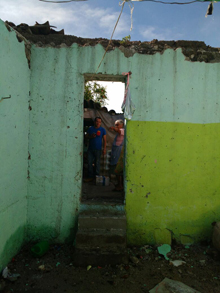 It’s been one month since Mexico was hit by the strongest earthquake in over a century. Recovery has been slow in most areas, and incremental in others—in rural towns outside of Mexico City and Puebla, thousands of people remain homeless. Without power. Without phones. Without running water.
It’s been one month since Mexico was hit by the strongest earthquake in over a century. Recovery has been slow in most areas, and incremental in others—in rural towns outside of Mexico City and Puebla, thousands of people remain homeless. Without power. Without phones. Without running water.
During times of crisis, schools and libraries can be a refuge for children, who benefit from the sense of normalcy provided by going to school, as well as a means of accessing the information and community resources needed to rebuild.
Unfortunately, repairing and rebuilding efforts are often hindered by slow systems and insufficient funding. While providing residents with shelter, food, and security, should be our priority, we can’t underestimate the role that education can play in the aftermath of a natural disaster.
“School isn’t a priority for them. They have their homes, and often they have their business next to their houses. They have to ask: How do I use my savings, in rebuilding my business or in rebuilding my house?” said Mere Rivera, promotora de lectura at Consejo Puebla de Lectura, or Puebla Council.
We asked Rivera how the ILA community can best support rebuilding efforts in affected schools, libraries, and surrounding communities. Here’s how you can help:
Support for schools and libraries
- Mexico City-based librarian Verónica Juárez Campos keeps track of libraries that need assistance in her blog post, “Las bibliotecas también necesitan ayuda,” or, “Libraries also need help.” She provides contact information and lists of requested supplies, when available.
- Libraries in the state of Morelos were among the hardest hit. Contact the coordinator of Morelos’ network of public libraries, Jesús Reyes Posadas, to inquire about donating.
- Among many other initiatives, UNICEF is working to establish temporary schools, promote school safety guidelines, train teachers in psychosocial support, and distribute education supplies and early childhood development kits to teachers and caregivers.
- The American Library Association (ALA) is supporting response and recovery efforts for libraries damaged by the earthquake through the ALA Disaster Relief Fund.
Local rebuilding efforts (sites in Spanish)
- Casa de la Ciencia (Atlixco) accepts in-kind donations to support community education around natural disasters. Contact Jade González Minutti to learn more.
- Donations made to Brigada Comunitaria por la Mixteca Poblana will go towards reconstruction projects and to restoring emotional, economic, cultural and social well-being in rural regions. Learn more about the brigade and how to donate here.
- Nonprofit Avima AC’s Proyecto Epatlán is focusing on rebuilding with safer structures in the small town of Epatlán. Contact Gabriela Domínguez Gálvez for more information.
- Fondo Unido México, part of the United Way network, has created an emergency fund to focus on the reconstruction of schools and community centers as well as training and preparation for future emergencies.
National rebuilding efforts
- New York City-based nonprofit Project Paz is raising funds specifically for earthquake relief.
- Donations made through charity crowdfunding site GlobalGiving’s Mexico Earthquake Relief Fund will be used exclusively for local relief and recovery efforts.
- The International Community Foundation has established an earthquake disaster relief fund to help local organizations meet short-term basic needs, and to assist in long-term recovery efforts.
- Cruz Roja Mexicana, the Mexican Red Cross, is accepting direct donations online and has set up an Amazon Wish List for necessary items.
We will continue to update this resource as we learn of new initiatives.
Alina O’Donnell is the editor of Literacy Daily.